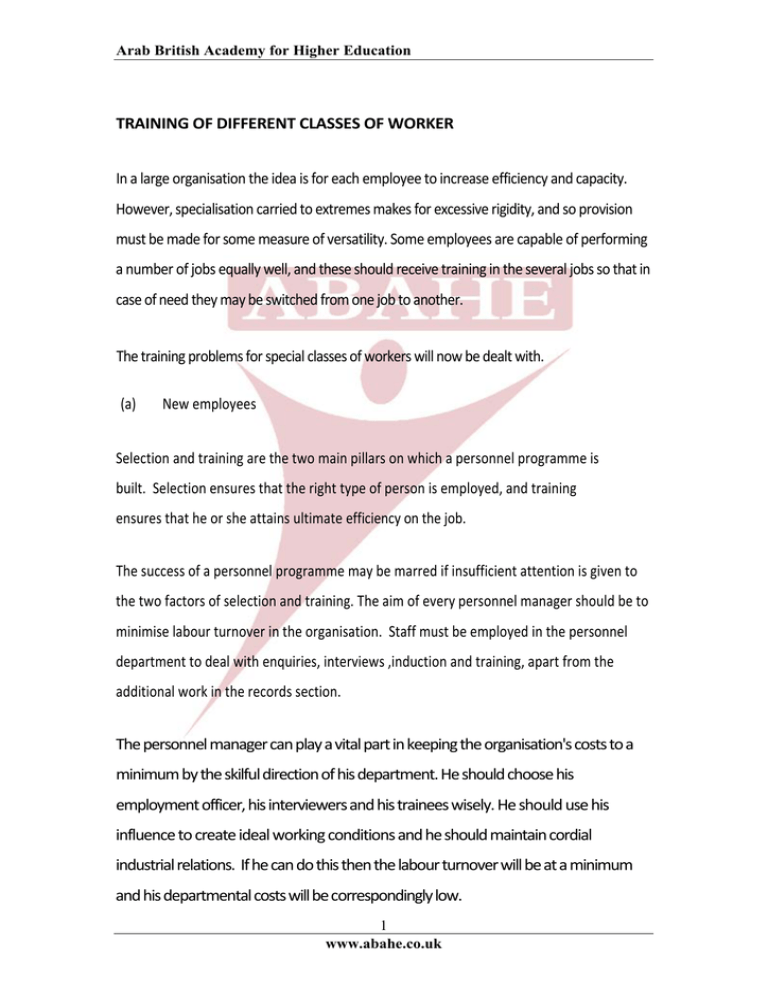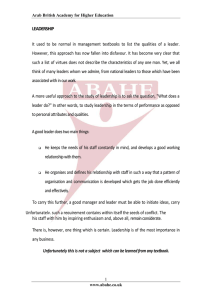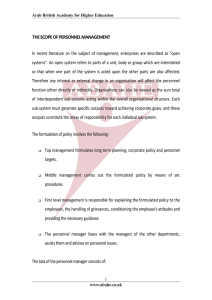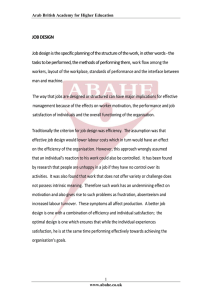
Arab British Academy for Higher Education
TRAINING OF DIFFERENT CLASSES OF WORKER In a large organisation the idea is for each employee to increase efficiency and capacity. However, specialisation carried to extremes makes for excessive rigidity, and so provision must be made for some measure of versatility. Some employees are capable of performing a number of jobs equally well, and these should receive training in the several jobs so that in case of need they may be switched from one job to another. The training problems for special classes of workers will now be dealt with. (a) New employees Selection and training are the two main pillars on which a personnel programme is built. Selection ensures that the right type of person is employed, and training ensures that he or she attains ultimate efficiency on the job. The success of a personnel programme may be marred if insufficient attention is given to the two factors of selection and training. The aim of every personnel manager should be to minimise labour turnover in the organisation. Staff must be employed in the personnel department to deal with enquiries, interviews ,induction and training, apart from the additional work in the records section. The personnel manager can play a vital part in keeping the organisation's costs to a minimum by the skilful direction of his department. He should choose his employment officer, his interviewers and his trainees wisely. He should use his influence to create ideal working conditions and he should maintain cordial industrial relations. If he can do this then the labour turnover will be at a minimum and his departmental costs will be correspondingly low. 1
www.abahe.co.uk
Arab British Academy for Higher Education
Statistics have shown that the greatest turnover in labour occurs among unskilled workers, therefore if the problem is to be dealt with adequately it is necessary to also attend to those who require little or no skill in their jobs. This is not an easy problem, since the element of boredom may in the end, defeat all the efforts of the personnel manager. When a person becomes bored he tends to adopt the attitude of "anything for a change", and this may lead to job changing. The only solution to this problem is to introduce a certain amount of variation into the tasks. A switch from one department to another will give the opportunity for new surroundings and the possibility of meeting new people. (b) Supervisors and foremen. The ideal for any organisation is to promote from within rather than use external recruiting. ‐''If the rank and file personnel know that the opportunity is there for each of them to rise to better paid and more responsible positions, then there will be a readier response to undertake further training courses. Unfortunately most organisations endeavour to promote their most highly skilled operatives to supervisory positions. This may be regarded as the best thing to do. These people have the skill, and they should be able to show others how the job should be done, and to supervise the day to day operation of the work. However, as stated previously, it does not follow that because a worker • is excellent at his job, he will make a first class teacher, or for that matter, a first class supervisor. The personnel manager should be very reluctant to agree to a proposal from the works manager that a certain "Mr Y" be promoted before he has received sufficient training and has given evidence of his ability to hold down the job. A works manager should always see that his supervisors have under‐studies and that these potential supervisors receive a certain amount of training and testing on the job. They should be allowed to deputise for the supervisor in cases of leave or sickness. 2
www.abahe.co.uk
Arab British Academy for Higher Education
Supervisory trainees should receive training under the direction of the training officer in such subjects as "personnel welfare", "health and safety", "training methods" and "the place of supervisors within the organisation". Supervisors and supervisory trainees do not lend themselves to the same type of training as, say, apprentices. The older men are not as adaptable to long periods of concentration on educational projects. The best form of training for such employees is the round table method, where a few established principles are set before the group for discussion of the problems arising from the application of these principles. If the personnel manager feels that the organisation cannot offer an adequate course for the supervisors, it should be possible for arrangements to be made with a local technical institution, for attendance on a rota basis. Great care should be taken in the training of supervisors as they are the first link in the connection between management and the workers. The supervisor can do much to further the success of the organisation by the way that he handles personnel problems and excites the loyalty and enthusiasm of the workers under his control. (c) Executives Executives require knowledge and training in new methods. Junior executives usually do not present any difficulty as they are full of determination to make the top grade. They will come along willingly to learn everything that is offered to them. They are even keen to do assignments so as to consolidate the results of their labour. For these people, formal lectures by experts, as well as discussion groups, should be arranged. This will allow the junior executives to become 3
www.abahe.co.uk
Arab British Academy for Higher Education
conversant with day to day problems in the organisation and they will also learn how such problems are tackled in other organisations. There is always a problem in arranging a training programme for senior executives. It would appear that the only real solution is for the Managing Director to hold informal conferences which they should attend. At these conferences changes in policy can be discussed and new ideas considered. If necessary an industrial consultant may be invited to give his views on the matter under consideration. If the discussion is on personnel policy, then the personnel manager should be invited to attend the conference so that he may give those present the benefit of his research and experience. (d) Salesmen Up to this point much has been said regarding training in terms of factory or office. Yet, however good the training system in these sections, it will not avail unless the produce can be sold. Markets are becoming more competitive and only highly trained salesmen can hope to succeed. It is essential, therefore, that an effective system of selection and training be devised. The sales manager and personnel manager should work together on this project. Firstly, in the matter of selection, only the most likely candidates, should be accepted for training. Those who negotiate the first obstacle should then be sent for interview to: (a) The employment officer (b) The area sales manager. 4
www.abahe.co.uk
Arab British Academy for Higher Education
(c) The sales manager This procedure will ensure that only the most suitable applicants are accepted. Even so, one particular organisation which has adopted this method of selection has found that only one third of the selected candidates eventually make the grade. The training programme which follows takes the form of twelve weeks training during which the trainee is taught all about sales office procedure and the organisation's products. Where the organisation is concerned with such products as tractors, then maintenance work forms an indispensable part of the training. The trainees should also receive training in the best methods of teaching others to use the machines which they have purchased. They must also be taught the techniques of selling and a sales manual which incorporates the latest selling ideas should be made available to each trainee. When this initial training period is complete, the training programme will then fall mainly outside of the province of the personnel department and the responsibility will be taken over by the sales department which will then arrange for on the job training. (e) Office staff The training as regards office staff is largely a matter of learning standard methods. Shorthand typists, computer operators, etc. receive their training at special schools. The professional staff usually receive their training at part‐time evening classes, at technical colleges or by means of correspondence courses, such as this one. 5
www.abahe.co.uk
Arab British Academy for Higher Education
All members of the staff should be encouraged to acquire professional qualifications, and inducements should be offered, either by merit payments or by a promise of a refund of all or part of the fees paid if success is achieved in the examination. To sum up the training procedure, it would seem that in any successful system of training, there must be standard methods of performance which are enforced throughout the organisation. Trainers should specialise in a limited number of jobs, their work being co‐ordinated by the training officer. The standard of performance of each employer should be kept constantly under review, and where refresher courses are deemed advisable, the opportunity should be taken to introduce new techniques. All Rights Reserved © Arab British Academy for Higher Education
6
www.abahe.co.uk




